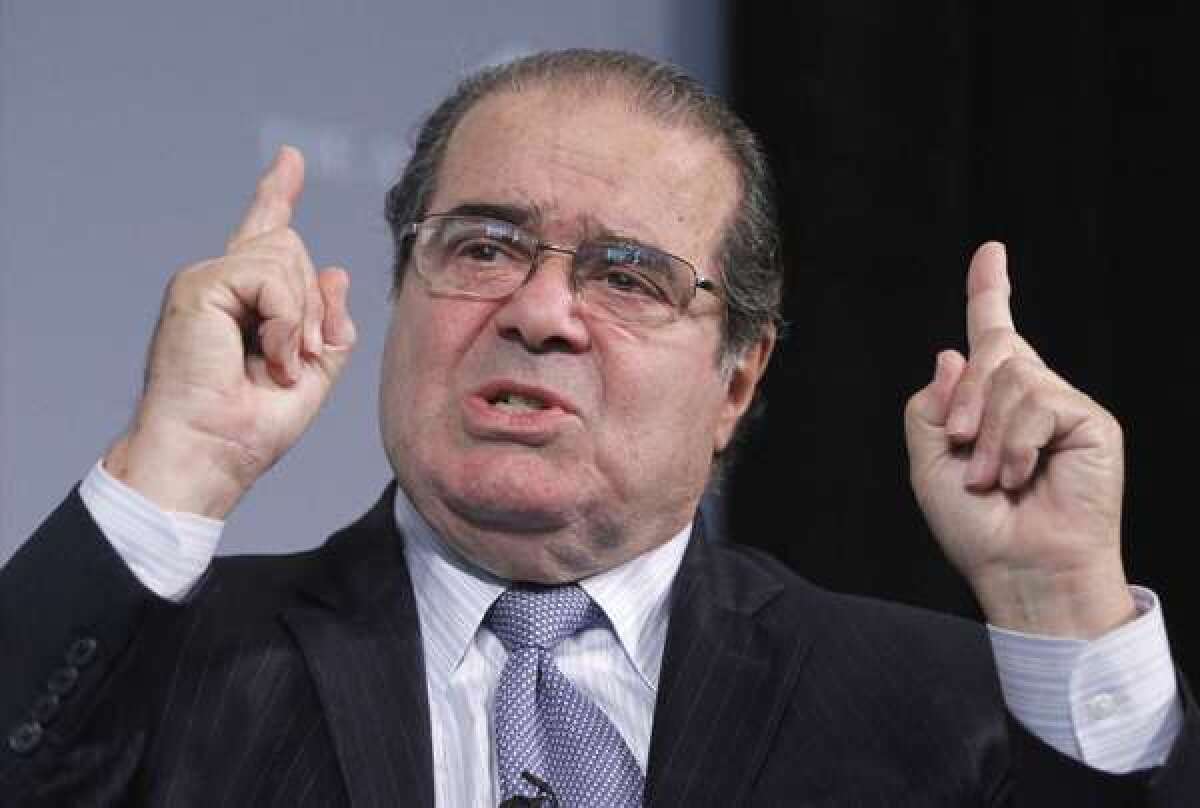For Scalia, no gay people, just gay sex?

Is there anything more to be said about Justice Antonin Scaliaâs sulphurous comments about homosexuality, which prompted a gutsy student at Princeton University to confront the voluble jurist this week about his rhetoric? One thing at least: Scaliaâs discomfort with the idea that there is such a thing as a gay or lesbian person.
The quotations from Scalia opinions that so dismayed Princeton freshman Duncan Hosie all referred to homosexual conduct. For example, in a 1996 case the majority of the court held that voters in Colorado had exhibited âanimusâ toward gays by making it impossible for the state or municipalities to pass laws protecting them from discrimination. Scalia responded: âI had thought that one could consider certain conduct reprehensible â murder, for example, or polygamy, or cruelty to animals â and could exhibit even âanimusâ toward such conduct.â In his dissent Scalia did refer to âhomosexualsâ (he assiduously avoided the word âgayâ except in quoted material), but he used that term interchangeably with âthose who engage in homosexual conduct.â
And what of the notion of âsexual orientationâ? Scalia did acknowledge in his Colorado opinion that such a thing might exist. For example, he wrote that it was permissible for states to criminalize homosexual conduct (as it was in 1996) âsurely it is rational to deny special favor and protection to those with a self avowed tendency or desire to engage in the conduct. In the next sentence he suggests that ââhomosexual-orientationâ is an acceptable stand-in for homosexual conduct.â
The notion that there are no homosexual people, just homosexual acts, is an ancient one. Until recently it was the attitude of the Roman Catholic Church. Scaliaâs son Paul, a Catholic priest who has served as chaplain to Courage â âa spiritual support group to help those with same-sex attractions live chaste livesâ â continues to resist the idea of a gay identity. He has written: âWe must always distinguish the person from the attractions. Most errors in this area come from the reduction of the person to the attractions: to say, âA person who has homosexual attractions must be homosexual.â This reduces the human person to the sum total of his sexual inclinations.â
In a 2005 article in the magazine First Things, Paul Scalia warned against the labeling of high school students as âgayâ and even took the Vatican to task for using the term âhomosexual person,â which, the younger Scalia said, âsuggests that homosexual inclinations somehow determine, which is to say confine, a personâs identity.â Of course, this is a straw man; psychologists and other who speak of a gay identity donât argue that âgayâ is an exhaustive description of an individualâs personality traits, only that there is more to being gay or lesbian than participation in sexual acts.
Contrast the Scaliasâ approach to this passage in Justice Anthony Kennedyâs majority opinion in the 2003 case of Lawrence vs. Texas, which overturned a Texas law against same-sex sodomy. Kennedy wrote: âThe case does involve two adults who, with full and mutual consent from each other, engaged in sexual practices common to a homosexual lifestyle. The petitioners are entitled to respect for their private lives. The state cannot demean their existence or control their destiny by making their private sexual conduct a crime.â Some gay activists blanched at Kennedyâs use of the term âhomosexual lifestyle,â but applauded his larger point: that what was at issue was the lives of gays and lesbians, not isolated sexual acts.
Scalia dissented in that case, too, arguing that Texasâ sodomy law âseeks to further the belief of its citizens that certain forms of sexual behavior are âimmoral and unacceptableâ â the same interest furthered by criminal laws against fornication, bigamy, adultery, adult incest, bestiality, and obscenity.â
The conventional interpretation of Scaliaâs opinions in gay-rights cases is that he doesnât like gays; but maybe the more accurate gloss is that he doesnât believe they exist -- except when they are engaging in (or thinking about) âimmoral and unacceptableâ sexual acts.
ALSO:
Letters: Gay marriageâs day in court
Gulp! The high cost of Big Sodaâs victory
Latest conservative attack on Planned Parenthood falls flat
More to Read
A cure for the common opinion
Get thought-provoking perspectives with our weekly newsletter.
You may occasionally receive promotional content from the Los Angeles Times.











